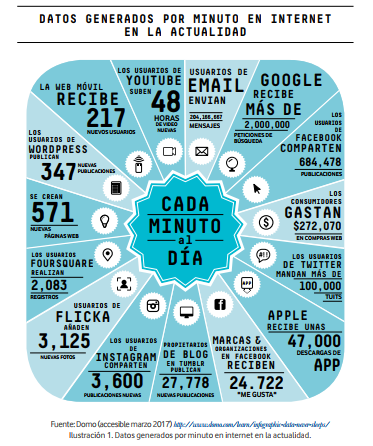
‘The isolated information of each person has little value, but when added to that of billions of other people, objects, and cities, it becomes a gold mine. That gold mine is referred to as Big Data. Knowing how to make the most of it is a talent for Big Data. The report Generation of Big Data talent in Spain – prepared by a Working Group on Big Data launched and coordinated by Telefónica and which saw collaboration on the part of some twenty institutions belonging to the Fundación Cotec para la Innovación – reviews recent analyses regarding the situation and perspectives of the Big Data market and incorporates some of the best international practices for the creation and organisation of profiles in this field.
At the heart of the digital revolution is the massive availability of data – Big Data – fuelled by intensive information exchange on the Web. In this context, the report, which was published last April, addresses what Big Data really includes, what its current importance is, what role Big Data will play in the near future, what the role of Europe and Spain is, as well as the worldwide shortage of Big Data talent, and the specific case of Spain. Over its one hundred pages, the document analyses this phenomenon and also gives suggestions on how to generate Big Data talent in the educational field, the private sector, public administration, and by means of networks of knowledge and expertise.
The experts who drafted this report warn that a world is coming into being that can be understood in terms of data and yet still lacks professionals for its development, and that consumers and citizens understand the implications of the massive use of data and recognise its value.
The data economy and the need for Big Data talent

One minute of virtual tracking is the equivalent to millions of data points. ‘In the time required to read this line,’ it notes, ‘200 million emails have been sent, 2 million searches have been typed into Google, 50 hours of video have been uploaded to YouTube, and sales amounting to 170,000 euros have been made on Amazon. Data has been dubbed the oil of the 21st century.’ (See attached chart)
If it was already noted in 2014 that open data policies could increase G20 countries' revenues by 700-950 billion dollars each year, this report reflects the assessment of Erik Brynjolfsson, director of the MIT Initiative on the Digital Economy, that leveraging data has the potential to transform any industry and that companies making data-based decisions achieve 5%-6% more productivity. And it highlights, just as in the report ‘Big Data: The next frontier for innovation, competition, and productivity’ by the McKinsey Global Institute, that this phenomenon also affects citizens’ quality of life. Leveraging data can mean, it notes, optimising traffic, improving health, or revolutionising consumption.
According to data collected in the study, the estimated value of the data economy in Europe was 1.87% of the GDP of member countries in 2015 (272 billion euros) and is expected to reach 4.7% in 2020. In addition, 65% of companies risk becoming irrelevant or non-competitive if they do not adopt Big Data. The Big Data market in Spain is growing by 30% each year and employed 10,500 specialists in 2015. An initial caveat is that 19% of these jobs were generated outside the country.
The report shows that Big Data is still a recent phenomenon in the workplace and presses for the hiring of these new professional profiles, identifying four main roles: managers and consultants, data scientists, architects and data engineers, and users.
Furthermore, it also analyses the shaping of the data economy as an emerging economy and an opportunity to reposition Europe in this new market.
Plan and recommendations 2016-2020

After carrying out an in-depth analysis into the current situation and forecasts of the Big Data market, as well as of the main international benchmarks in training and attracting talent in this field, the report articulates a series of recommendations that are confirmed by experts from various sectors for the generation of Big Data talent in Spain, in the education system, in companies, and in public administrations. Specifically, an action plan is being drawn up for the development of Big Data talent in Spain, which is divided into four areas:
- Talent via training: It is necessary to promote new areas of knowledge and generate good educational practices from primary to university education, as well as specialisation courses aimed at recent graduates who deem advanced degrees to be necessary in key areas, such as: data scientists, visualisation engineers, database developers, and more.
- Talent in companies: In order to drive the evolution of companies towards the Data Driven culture that allows them to profitably take advantage of data and understand users and markets, taking steps to promote a culture of data within companies with the support of Senior Management, as well as steps to generate mixed profiles that provide the ability and mindset to handle data.
- Talent in public administration: Big Data training, promoting internal democratisation of data and dissemination of benefits and results, and fostering a culture of openness and transparency with public information.
- Knowledge communities: Facilitate access to knowledge in experimental and innovative environments, facilitate links between academia and business, and foster ‘data literacy’ for consumers and citizens.
In addition to the opportunity presented by Big Data for Spain and Europe, the report also warns that this phenomenon risks becoming another contributing factor to inequality. In this regard, it notes that, so far, it is the powerful economies, the countries with the highest GDP per capita, that have benefited most from technological advances in information technology, warning that efforts to improve the competitiveness of countries or regions can have a counter-productive effect, increasing inequality various segments of society. ‘If technological advances are not supported by inclusive policies, they could aggravate rather than mitigate problems of inequality,’ it concludes.
In Europe, we are in the middle of the European Horizon 2020 (H2020) strategy, which defines Big Data as a priority, a clear opportunity in almost all areas of expertise due to the potential contributions of data analysis when making decision, in the opening of new markets, and in the forecasting of results.